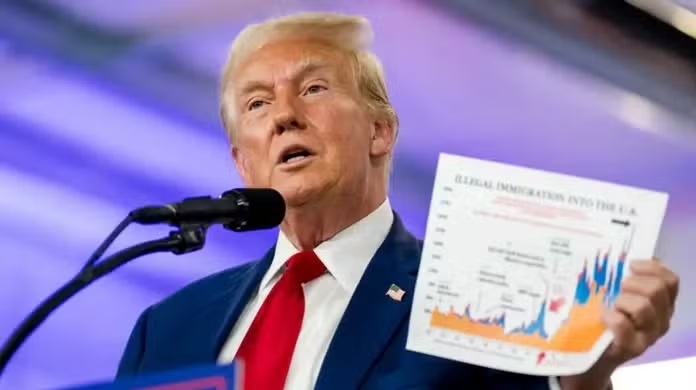Donald Trump’s tariff policies are creating an unwanted side effect: an increase in anti-American sentiment around the world. From boos to the U.S. national anthem in Canada, to fiery protests in Panama and sharp criticism in Europe, signs of international dissatisfaction are becoming increasingly evident. Opinion polls point to a deterioration of the U.S. image in various countries, which could have significant consequences for trade and diplomatic relations.
Since the beginning of his presidency, Donald Trump has adopted a transactional and aggressive approach to international relations, prioritizing the U.S. trade balance above any diplomatic consideration. His strategy is based on the belief that trade negotiations are a zero-sum game, where there is always a winner and a loser. In this way, Trump seeks to pressure historic allies and trade partners into accepting new deals that favor the United States, through the imposition of tariffs and economic threats.

Although this tactic may yield immediate gains in certain sectors, analysts warn that it could undermine diplomatic relations built over decades. The U.S. president’s stance has sparked negative reactions in various countries, including traditional U.S. allies.
Canada has been one of the most affected countries by Trump’s tariff policies. The economic impact and the president’s aggressive rhetoric have generated a strong response from both the Canadian population and government. Among the public manifestations are:
- Boos to the American anthem during sporting events, a public disapproval gesture that has become frequent in recent months.
- Changes in consumption habits, with citizens replacing American products with local alternatives. Coffees previously called “Americanos” began to be sold as “Canadian coffees,” and U.S. products were removed from some shelves.
- The creation of apps that allow consumers to identify the origin of products in supermarkets, encouraging boycotts of U.S. goods.
Former Prime Minister Justin Trudeau, who recently left office, was one of Trump’s main critics. According to Trudeau, the actions of the American president aim not only to pressure the Canadian economy but also to pave the way for a possible annexation of Canada to the United States—although this hypothesis is considered unlikely by political analysts.
In Central America, Trump’s rhetoric about a possible takeover of the Panama Canal has inflamed nationalist sentiments. In response, Panamanian protesters organized public acts, including burning U.S. flags. Historical resentment, combined with the aggressive rhetoric from the White House, fuels discontent in the region, reinforcing the perception that the United States continues to act as an imperial power.
In Europe, the reaction to Trump’s foreign policy has been visible both in political discourse and cultural manifestations. In Düsseldorf, Germany, a carnival parade depicted Trump and Vladimir Putin shaking hands on a float, with a sign labeling the gesture as the “Hitler-Stalin Pact 2.0.” The historical comparison aims to highlight European distrust of the relationship between the two leaders.
In the United Kingdom, even traditionally U.S.-aligned conservative politicians have expressed dissatisfaction. Nigel Farage, one of the leading figures of the British far-right, strongly criticized U.S. Vice President JD Vance’s remarks about the “random” role of the UK in supporting Ukraine. The British response was immediate: the tabloid The Sun published a caricature of Vance with expressions like “shame,” reinforcing public dissatisfaction with the U.S. stance.
The growing anti-American sentiment is also reflected in direct economic impacts on companies associated with the current administration. Billionaire Elon Musk, one of Trump’s most prominent allies, has faced difficulties in international markets. The Chinese Passenger Vehicle Association warned that Musk’s involvement in American politics could further harm Tesla’s sales in China and Europe. The numbers confirm this trend:
- A 49% drop in Tesla sales in China in February.
- A 71% reduction in Germany during the same period.
- A 44% depreciation in France, deepening the company’s crisis.
Tesla’s stock has registered seven consecutive weeks of losses on the American stock market, and analysts believe that Musk’s polarizing image may lead consumers to choose competing brands like China’s BYD and Germany’s Volkswagen.
Trump’s protectionist strategy is not unprecedented in U.S. history. In 1930, then-President Herbert Hoover implemented the Smoot-Hawley tariffs, drastically raising import taxes. The measure contributed to worsening the Great Depression and prompted other countries to reduce their reliance on trade with the U.S., forming new trade alliances.
Recent studies suggest a similar effect may be occurring now. According to research conducted by the Leavey School of Business, Sciences Po, and the University of Vienna, imports of American products have fallen by 15% to 20% in several markets, even without formal retaliation.
Within the United States, there is growing concern about the impact of anti-Americanism on the domestic economy. The American Soybean Producers Association, for example, has urged the government to reconsider the tariffs imposed on China, fearing that Brazilian producers will take the opportunity to increase their market share in China. This phenomenon occurred during Trump’s first term, when the trade war led Beijing to strengthen ties with countries like Brazil.
Trump’s strategy may please his electoral base by projecting an image of tough and uncompromising leadership. However, experts warn that the rebound effect of protectionist policies could lead the United States to an increasingly isolated scenario. In a globalized world, where trade alliances can be reshaped quickly, the gap left by Americans could be filled by other emerging powers.
If the “America First” policy persists without a long-term strategy to maintain allies and reliable markets, the United States risks becoming a less relevant country on the global stage, with an “America Last” outcome being the unexpected result of its own actions.

